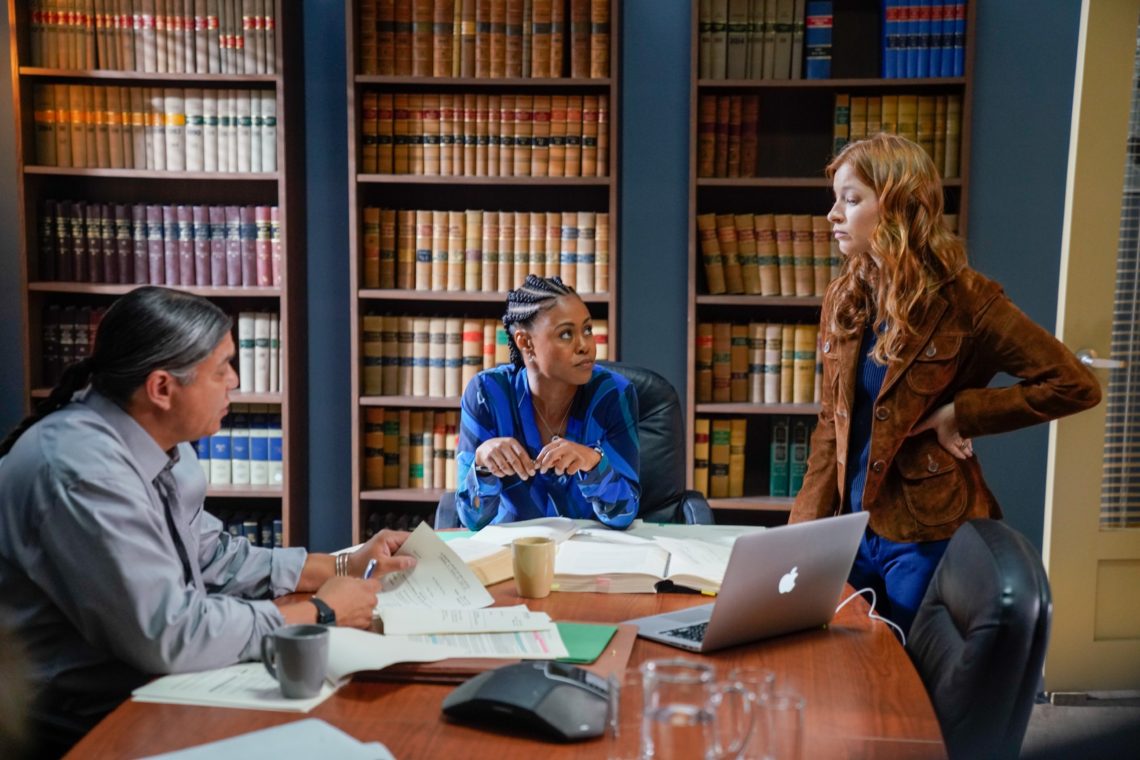
Diggstown Interview: Vinessa Antoine
“It’s going to be an interesting show for people because it’s either going to make you really angry or sad, or you’re going to nod your head in agreement and say ‘Oh, it’s about time. Finally, someone’s saying something.’ ”
Ahead of the Season 2 premiere of DIGGSTOWN, we sat down with lead actress Vinessa Antoine to discuss her path to acting, her character Marcie Diggs, and what to expect in Season 2.
Season 2 of DIGGSTOWN, premiered on March 4 on CBC and the free CBC Gem streaming service and will continue weekly Wednesdays at 8 p.m. (8:30 NT). You can also watch all of Season 1 on CBC Gem.
Can you tell us who you are, what you do and how you got involved in the industry?
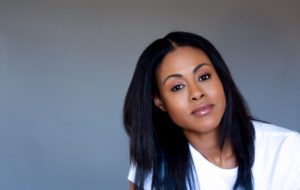 Vinessa Antoine: My name is Vinessa Antoine and I’m an actor. I started off as a dancer when I was really young, training in ballet, and eventually moved to New York and joined Alvin Ailey American Dance Theatre for a while. That evolved into doing a lot of theatre and from there television.
Vinessa Antoine: My name is Vinessa Antoine and I’m an actor. I started off as a dancer when I was really young, training in ballet, and eventually moved to New York and joined Alvin Ailey American Dance Theatre for a while. That evolved into doing a lot of theatre and from there television.
How was your time at Alvin Ailey?
VA: It’s such an interesting place. Back then, it felt more about the soul and having something to say. It was mind-changing. I got to a point when I turned 19–20, really just stepping into adulthood, when I started to realize I wanted to express myself in a different way. I didn’t have the maturity, or the life experience at that time, to understand that I could still do that through movement. I really wanted to emote and try something else. It was screaming to come out of my body. For me, acting was cathartic.
How did you make that transition from dance to theatre?
VA: I started off in the theatre when I was really young. I didn’t think much of it, I just loved hanging out with my weird theatre friends. In high school, I didn’t fit in with the quote-unquote popular girls, I definitely was not an athlete at all and I could barely get through academic stuff. I was a writer and more of a lit girl but math and science — no.
Then I found my weird tribe of people. I loved hanging out with my friends reading plays and just staying after school in the theatre doing stagecraft. We did a bunch of acid and we just hung out all the time. That was my early theatre days and then I just left it alone because I thought there is no way I could actually be an actor. I didn’t really have a voice either, I wasn’t singing, I was just doing plays. So I thought, I’ll just leave the theatre alone.
It was reintroduced to me in New York when I wasn’t working and needed to work. I auditioned for this one-act straight play that was a two-hander and I just dove in and found my love again.
And how did you move into television from there?
VA: I was doing commercials just to pay the rent, and at that time you could make some pretty good money, and I met a manager at one of my acting class showcases. She gave me her card—I thought she was bullshit—and she was like ‘I think you’ve got a great look and I can get you in the room.’ And literally the next day she called and was like ‘I have an audition for a movie.’ I booked it and things started happening from there.
How did you hear about and eventually get involved with Diggstown?
VA: I got an audition, and they sent the script. I read the first few pages and was like ‘wait a second, this is for the lead, this is cool. I’m not playing the best friend. That’s interesting.’ As soon as I went in to read for it I felt like I knew who this character was. I just connected with it and it took off from there.
What was it about Marcie Diggs that made you connect to her?
VA: It was her strength but also her ability to still be vulnerable. I think one of Marcie Diggs superpowers is her incredible empathy for humanity. She’s just passionate about making sure things get done the right way and making sure everybody gets a fair shot. It doesn’t matter who you are or what background you come from, what colour skin, what gender, what religion. Everybody deserves a fair shot.
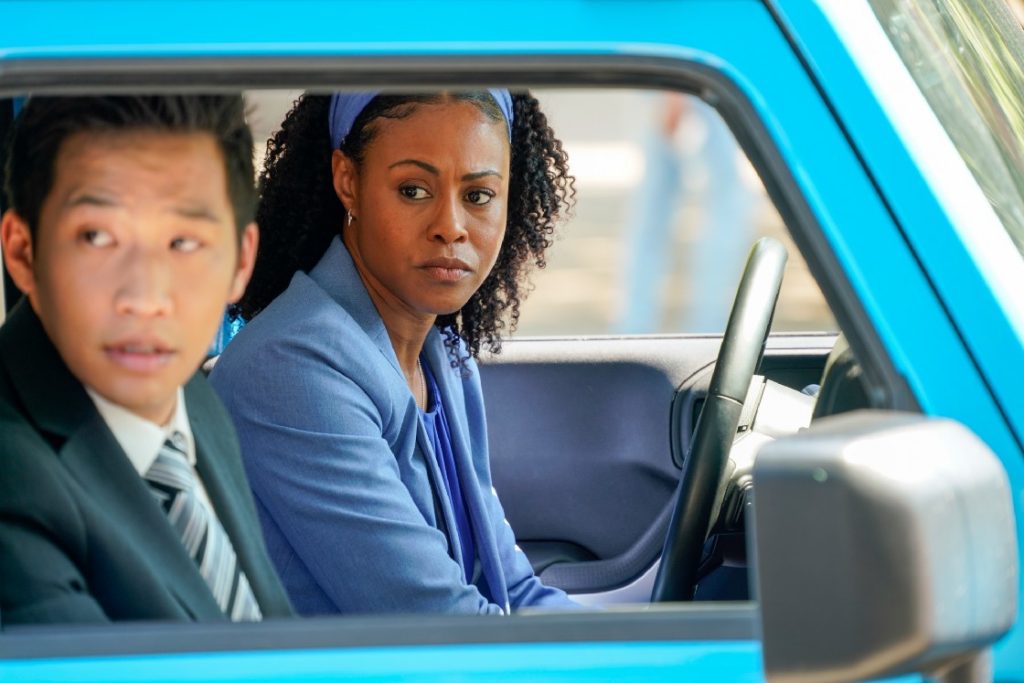
Diggstown is very political, which I wasn’t expecting, especially from a Canadian show. Can you speak about what it’s like to talk about these issues on screen?
VA: For sure it’s different for Canadians. It’s interesting because we’re so close to the States, a country that is all about talking about social issues openly. They’re dealing with a lot of issues that Canadians don’t think we are dealing with. I think there is, at times, a passive way of dealing with some of the issues that we have here in Canada. We are either not talking about it or we’re talking about it behind closed doors.
There’s certainly a very conservative way of looking at issues within diversity, the transgender communities, women’s issues, millennial issues, the Indigenous community, police brutality. There are things happening in this country that we are just smiling through and being really friendly about. We are standing up and saying this isn’t right but no one is actually doing anything about it. I think Floyd Kane has found a digestible, bite-sized way to show that people can at least start having conversations about these topics.
In the second episode of Season Two, I was surprised to hear two people speak so casually in an Indigenous language, I don’t know that I’ve seen that on a prime-time drama. What was that like to film?
VA: That felt very normal to me. I felt like, why wouldn’t we? We have so many people that speak that language. We have so many languages in this country, and for it to just be focused on English and French is ridiculous at this point. We should have a lot of television shows that reflect the society that we live in. I’ve got friends that go from Italian to English in midconversation, speaking all kinds of Asian languages in a conversation and it’s no problem.
If you don’t understand it, it’s called Google translate. I mean at this point we don’t need to say much more.
The Parasite win for Best Picture proved that these films resonate on all these different levels and television should reflect that as well.
VA: It should. Some people are like ‘Oh it’s in another language,’ but I think the younger generation is, at least for my kids, they don’t even bat an eye. It doesn’t faze them. You can literally put your phone up and scan things, you can listen and translate things, it’s not a big deal.
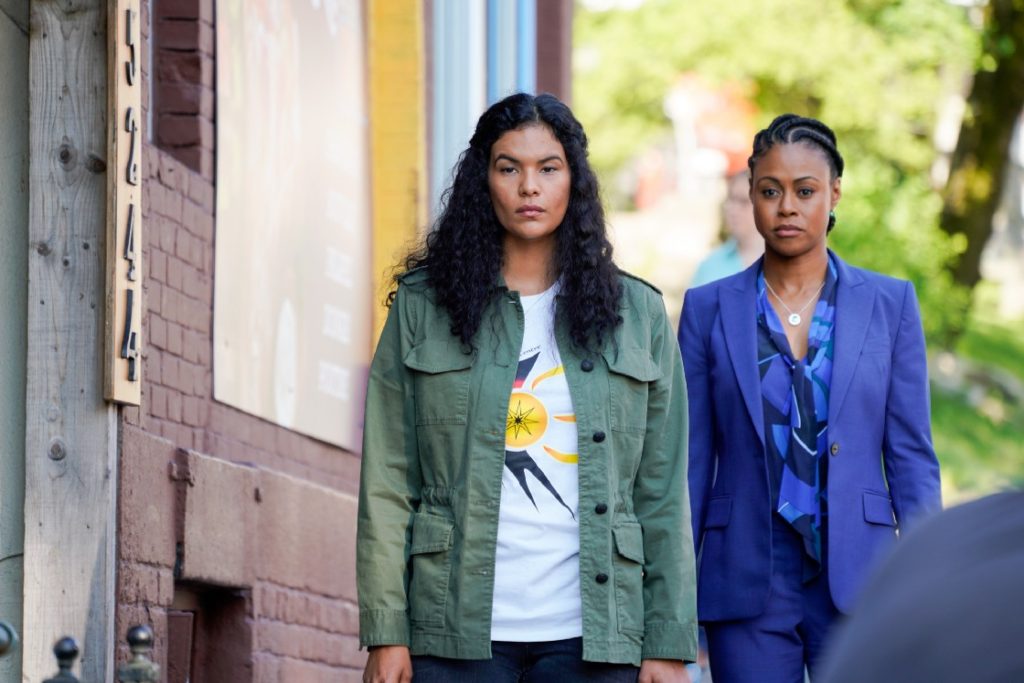
The first two episodes of Season Two deal with different aspects of racism. Specifically, in the second episode where the well-meaning white guy is called out, it’s rare to see that done so well. What is it like on set working with these kinds of intense but important storylines?
VA: I don’t think anyone was fanning themselves or fainting over it. Everyone was on board and understood the message that Floyd wrote. They understood their responsibility in telling that story. Maybe there were some extras in the back that were just like ‘Woah, I can’t believe that this is happening or that they’re saying that.’ But I think internally they knew that this is something that is talked about all the time.
There have been some preferences in the justice system when dealing with people that are not part of a certain diverse group. There are caucasian people with money that are able to get through and there are some Indigenous, poor people who haven’t been able to get through.
It’s going to be an interesting show for people because it’s either going to make you really angry or sad, or you’re going to nod your head in agreement and say ‘Oh, it’s about time. Finally, someone’s saying something.’
Diggstown shows different aspects of the law and the way it works. How do you prepare for that?
VA: Oh my gosh. Well, the jargon and the vocabulary — I have to study a lot. That’s one part of it. I’ve learned a lot about law actually, working on the show. Maybe I’ll be a lawyer after this. –laughs-
Because Floyd comes from a law background, he was an entertainment lawyer, he understands a lot more than the rest of us. I tend to go to him for all my questions. I just try to understand it as much as possible from a pedestrians point of view and try to break down exactly what I’m saying so that it makes sense to me. Hopefully, I make it look like I know what I’m talking about.
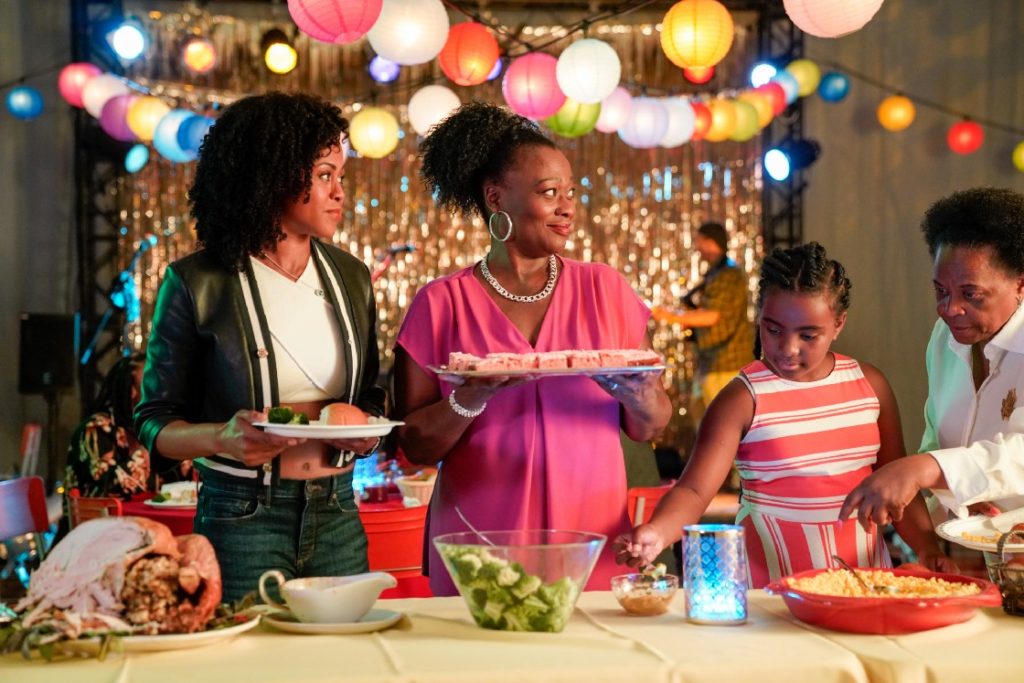
How has Marcie evolved from Season One to Season Two?
VA: I think she’s a lot more comfortable. I think in the beginning she separated herself from the group, I don’t think she really wanted to have friends, she was still grieving her aunt. She used that place as a way to escape what was really going on with her.
Since that time, it’s been about 18 months so when we see her come up in Season Two she’s been dating and hanging out with her co-workers and she’s taken on all of these cases. I think she’s gotten into a rhythm. Now she’s in Legal Aid dealing with these cases on a daily basis and I don’t think she’s thrown off by any means. The stakes have gotten higher, it’s not just I’m a single mom and I want to keep my baby, it’s I just killed somebody, can you defend me.
Can you talk a bit about where the season is going to go?
VA: I will say that Marcie finds herself in some quicksand. She has made some compromises, she’s compromised her career a lot. She’s also dating more than one man so we’ll get some nice surprises for our ladies and gentlemen who are interested in Marcie’s dating life.
Finally, recommend one #MUFFApproved film for our blog readers.
VA: Someone Great.
I think Gina Rodriguez did such a great job and I always cry when I watch it. They’re so lovely together. LaKeith Stanfield’s awesome but she’s so grounded and I love her group of friends. Even though they’re not my age, it feels like my friends hanging out and supporting each other and going through all the levels of a breakup with your girls. And the music is great.
Keep up to date with Diggstown: Facebook | Twitter | Instagram
*This post was originally featured on The MUFF Society.*

